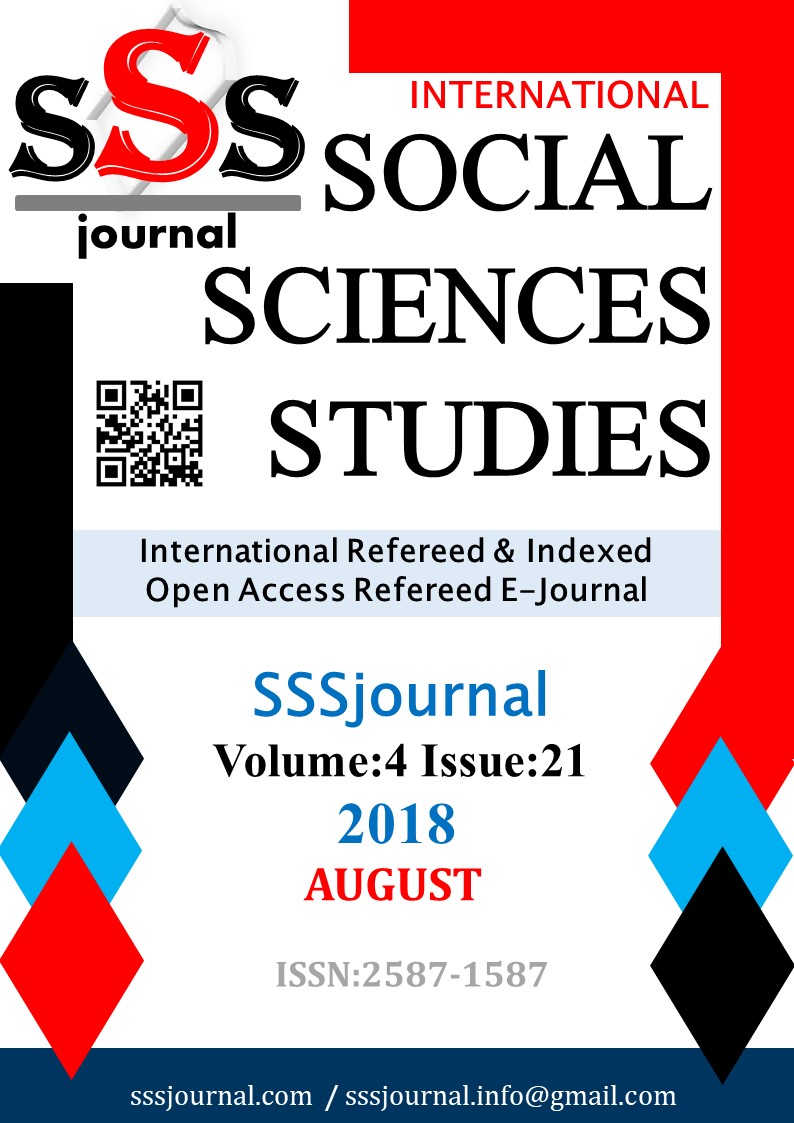BİLGİ PAYLAŞIMININ ÖĞRENCİ ARASINDA BİLGİ BRUKERLERİNİN ROLÜ VE ENGELLEYİCİ VE DESTEKLEYİCİ FAKTÖRLERİ "ÜNİVERSİTESİTEYE DAYALI BİR UYGULAMA"
Author :
Abstract
Bilgi paylaşımı, rekabetçi piyasadaki organizasyon performansı yenilemeyi ve geliştirmeyi planlayan yeni organizasyonun önemli bir parçasıdır. Bilginin paylaşılması, çeşitli bilim adamları tarafından çözüm sunmak ya da işlevi ve önemi hakkında yeni fikirler açmak için tanımlanmıştır. Bu çalışma, bilgi paylaşımını ve bileşenini perspektiften tanımlamaya ve bilgi tabanlı örgütsel gruplar içindeki paylaşım sistemlerine odaklanmaya çalışır. Bilgi yaratma örgütünün ana üyesi olan enstitüler bilgi paylaşım gruplarının performansına büyük ölçüde bağlıdır. Bu çalışmada niceliksel bir araştırma yaklaşımı kullanılmış ve bir anket yürütülerek birincil veriler toplanmıştır. Toplanan veriler, korelasyon, regresyon modeli ve yol katsayısı gibi farklı istatistiksel testler uygulanarak SPSS ve Smart-PLS' de analiz edilmiştir. Raporun Araştırma bulguları kolaylaştırıcının rolü engelleri rolünü azaltmak ve iyileştirmek üzerine bilgi acentesi güçlü ve olumlu etkileri olduğunu göstermektedir.
Keywords
Abstract
Knowledge sharing is an essential part of new organization that plans to innovate and improve organizational performance in the competitive market place. Sharing of information has been described by various scholars to present solution or opening new ideas about its function and importance. This work attempts to describe knowledge sharing and its component from perspective and focuses on the sharing systems within the knowledge based organizational groups. Institutes as the main member of knowledge creation organization is highly dependent on the performance of information sharing groups. In this study, a quantitative research approach is used, and primary data is collected by conducting a survey. The collected data is analyzed in SPSS and Smart-PLS by applying different statistical tests such as correlation, regression model and path coefficient. Research findings of the report indicate that there are strong and positive effects of knowledge broker on reducing the role of barriers and improve the facilitator’s role.
Keywords
- Armstrong, M. (2006). A Handbook of Human Resource Management Practice, Tenth edition, Cogan Page,
- Armstrong, M. (2006). A Handbook of Human Resource Management Practice, Tenth edition, Cogan Page, London.
- Bohn, R. (2000). Stop Fighting Fires. Harvard Business Review, 78: 83-91.
- Borgatti, S. & Cross, R. (2003). A Relational View of Information Seeking and Learning in Social Networks, Management Science, 9(4): 432-445.
- Cabrera, A. & Cabrera, E. F. (2002). Knowledge-Sharing Dilemmas. Organization Studies, 23: 687-710.
- Conklin, J.; Elizabeth Lusk, E.; Harris, M. & Stole, P. (2013). Knowledge Brokers in A KnowledgeNetwork: The Case of Seniors Health Research Transfer Network Knowledge Brokers, Implementation Science, 8 (7).
- Danny, P. (2007). Knowledge Management: Historical and Cross-Disciplinary Themes, Libraries Unlimited, 1-14.
- Davenport, T. H. (1994). Saving Its Soul: Human Centered Information Management, Harvard Business Review, March-April, 72 (2): 119-131.
- Duhon, B. (1998). It's All in our Heads. Inform, September, 12 (8).
- Fernie, S.; Green, S. D.; Weller, S. J. & Newcombe, R. (2003). Knowledge Sharing: Context, Confusion and Controversy, International Journal of Project Management, 21-177.
- Ganesh D. B. (2000). "Organizing knowledge in the knowledge development cycle", Journal of Knowledge Management, 4 (1): 15-26.
- Girard, J. P. & Girard, J. L. (2015). Defining Knowledge Management: Toward an Applied Compendium, Online Journal of Applied Knowledge Management, 3 (1): 14-23.
- Gupta, A. K. & Govindarajan, V. (2000). Knowledge Management’s Social Dimension: Lessons from Nucor Steel, Sloan Management Review, 42: 71-80.
- Holgate, S. A. (2012). Emerging Professions: Knowledge Broker. Retrieved from Science.
- Liebowitz, J. (1999). Knowledge Management Handbook, CRC Press, Boca Raton, Florida.
- Lomas J. (2007). The In-Between World of Knowledge Brokering. British Medical Journal. 334: 129-132.
- Marr, B.; Schiuma, G. & Neely, A. (2004). “The Dynamics of Value Creation: Mapping your Intellectual Performance Drivers”, Journal of Intellectual Capital, 5 (2): 312-325.
- Martinez Sanz, M. (2016). Overcoming Knowledge-Sharing Barriers, Paper Presented At PMI® Global Congress 2016-EMEA, Barcelona, Spain.
- Migle, M. & Caroline, M. (2014). Knowledge Brokerage: Towards an Integrative Conceptual Framework.
- Nonaka, I. (1994). A Dynamic Theory of Organizational Knowledge Creation, Organization Science, 5 (1): 14-37.
- Osterloh, M. & Frey, B. (2000). Motivation, Knowledge Transfer and Organizational Forms Organization Science, 11: 538-550.
- Polanyi, M. (1958). Personal Knowledge: Towards a Post-Critical Philosophy, University of Chicago Press. Powell, W. W. &
- Snellman, K. (2004). "The Knowledge Economy", Annual Review of Sociology, Annual Reviews.
- Riege, A. (2005). "Three‐Dozen Knowledge‐Sharing Barriers Managers Must Consider", Journal of Knowledge Management, 9(3): 18-35.
- Rowley, J. (2007). The Wisdom Hierarchy: Representations of The DIKW Hierarchy, Journal of Information and Communication Science, 33 (2): 163-180.
- Simandan, D. (2010). Roads to Perdition in The Knowledge Economy, Environment and Planning, 42(7):Takeishi, A. (2002). Knowledge Portioning in The Inter-Firm Division of Labor: The Case of Automotive Product Development, Organization Science, 13: 321-338.
- Wang, S. & Noe, R. A. (2010). Knowledge Sharing: A Review and Directions for Future Research, Human Resources Management, 20: 115-131.
- Wenger, E. (1998). Communities of Practice: Learning, Meaning, And Identity, New York, Cambridge University Press.





